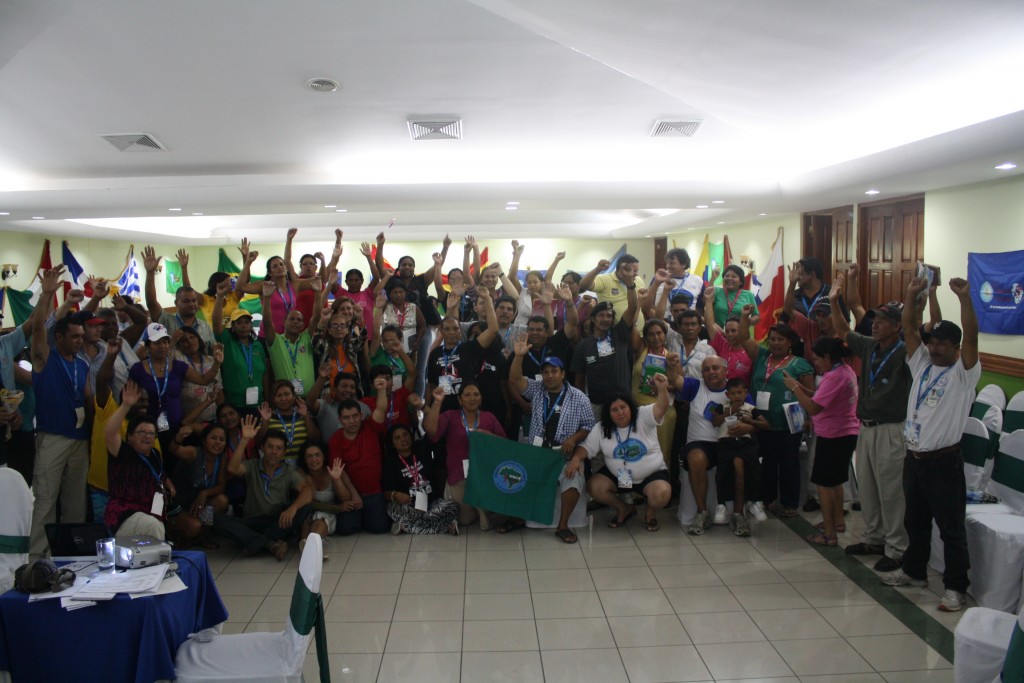United in solidarity with our brothers and sisters of the waste picking profession – 160 delegates from the 17 member countries of RED LACRE and RED NICA along with four countries representing 40 supporters – we have had had the opportunity to assemble with the purpose of dialoguing, debating, and sharing:
We waste pickers of Latin America and Central America dedicate ourselves to organizing our fellow wastepickers, pepenadores, cirujas, churuqueros, clasificadores, minadores, cartoneros, recolectores and buzos.
Waste pickers are individuals that recover, collect, transport, sort, participate in the pre-industry and commercialization processes of recyclable materials; make a living handling recyclable and reusable materials as the product of their labor and without exploiting anyone. In other words, waste pickers support their families by putting their hands in the trash. A waste picker is a person that performs the social service of recycling as her/his principal source of income.
In Nicaragua, we declare that in order to better undestand our working conditions, our struggles and organization, and to maintain and improve our profession, we depend on:
Sharing information amongst each other, creating work teams that are inclusive, especially of CENTRAL AMERICA.
With a team that specializes in creating, developing and organizing, we will pursue financing and self-financing for the waste pickers in accordance with plans established and approved by waste pickers.
We put forward an agenda that follows up on our peoples’ interests to advance waste pickers’ visibility, the visibility of waste picking as a profession and the right to continue and improve this line of work.
Our shared ideas:
– During our congress we observed that there is a fear of expressing all the difficulties in our home countries because of the different forms of intimidation and oppression that exist towards waste pickers and the profession of waste picking.
– If we organize ourselves as waste pickers, we can become more confident and able to strengthen ourselves.
– It’s necessary to develop defense and attack strategies against incineration and false solutions against climate change, the threat of eviction from landfills and dumps, which are our workplaces, and against corrupt, oppressive governments and national and multinational corporations that compete with our way of life and livelihoods and don’t recognize us as the agents of this work; and to continue to fight against corrupt NGOs that are simply using the image of Latin American waste pickers to mainatain their interests; and against “leaders and corrupt allies” that ally themselves with these NGOs and betry us.
– We should have a specific strategy for the landfills/dumps and urban waste pickers, work towards access and organizing in the workplace that will dignify and improve our waste pickers’ quality of life, focus on groups that are already organized and provide supportive technology and exchanges with other groups that still have nothing. It’s important to trust and bring confidence to our partners.
– Fight to take part in the creation of and changes in public policies that are inclusive of waste pickers
– Implement, value and facilitate planning strategies.
– Commemorate March 1 – International Waste Pickers’ Day – in memorium of the 1992 massacre at the private Colombian university, Livre de Barranquilla.
– Women – who make up the majority of waste pickers, and who are working mothers, often breadwinners, daughters and wives – should have equal access in the distribution of power in the workplace, to organizing and rights, and should be respected in landfills and dumps. Women waste pickers should have access to specific trainings about their legal rights. It’s very important to build a path towards gender equality.
– Our autonomy is a priority as well as sharing information between our countries and movements, and to support each other as brothers and equals.
– To build work teams that will handle technical, operational, logistical and administrative training, the political formation of waste pickers, and the organization and pursuit of resources.
– To work towards the recognition and valuing of waste pickers.
– To work towards the just commercialization of our recyclable materials from the streets to the dumps/landfills, and to organize in a direct way and improve our economic conditions.
– To work towards the technological improvement and professionalization of waste picking.
– Appropriate and safe technology in the workplace for the benefit of the environment.
– Improve our working environments, transport and infrastructure (machinery and equipment), in order for waste pickers to get closer to the production cycle with recyclable materials.
– Build capacities so that we are the administrators and are in control of our own enterprises.
– Work towards the recognition of waste picking as a profession by local, regional, national and multilateral governing bodies.
Organized, strong, and united as brothers and sisters, waste pickers from:
Argentina, Bolívia, Brasil, Chile, Colombia, Costa Rica, Equador, El Salvador, Guatemala,
Honduras, Nicarágua, Panama, Paraguai, Peru, Republica Dominicana, Uruguai, Venezuela.
Allies from: the United States, England, Italy and South Africa.
We are grateful for the openness, hospitality and support from the Nicaraguan Churequeros and Churequeras, the local and national authorities, local media and allies during this inspiring and historic event. We encourage you to continue strengthening our community.
Tweet


